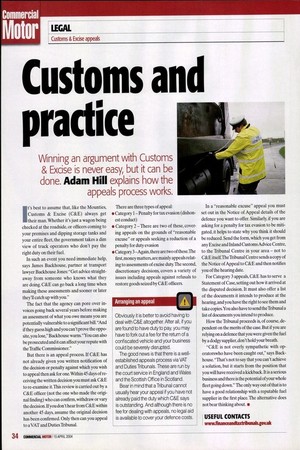Customs and
Page 32

If you've noticed an error in this article please click here to report it so we can fix it.
practice
It's best to assume that, like the Mounties, Customs & Excise (C&E) always get their man. Whether it's just a wagon being checked at the roadside, or officers coming to your premises and dipping storage tanks and your entire fleet, the government takes a dim view of truck operators who don't pay the right duty on their fuel.
In such an event you need immediate help, says James Backhouse, partner at transport lawyer Backhouse Jones: "Get advice straightaway from someone who knows what they are doing. C&E can go back a long time when making these assessments and sooner or later they'll catch up with you."
The fact that the agency can pore over invoices going back several years before making an assessment of what you owe means you are potentially vulnerable to a significant bill. "And if they guess high and you can't prove the opposite, you lose," Backhouse warns. "You can also be prosecuted and it can affect your repute with the Traffic Commissioner."
But there is an appeal process. If C&E has not already given you written notification of the decision or penalty against which you wish to appeal then ask for one. Within 45 days of receiving the written decision you must ask C&E to re-examine it. This review is carried out by a C&E officer (not the one who made the original finding) who can confirm, withdraw or vary the decision. If you don't hear from C&E within another 45 days, assume the original decision has been confirmed. Only then can you appeal to a VAT and Duties Tribunal. There are three types of appeal: • Category 1 — Penalty for tax evasion (dishonest conduct) • Category 2 — There are two of these, covering appeals on the grounds of "reasonable excuse" or appeals seeking a reduction of a penalty for duty evasion • Category 3 —Again,there are two of these.The first,money matters, are mainly appeals relating to assessments of excise duty. The second, discretionary decisions, covers a variety of issues including appeals against refusals to restore goods seized by C&E officers
In a "reasonable excuse" appeal you must set out in the Notice of Appeal details of the defence you want to offer. Similarly, if you are asking for a penalty for tax evasion to be mitigated, it helps to state why you think it should be reduced. Send the form, which you get from any Excise and Inland Customs Advice Centre, to the Tribunal Centre in your area — not to C&E itself.The Tribunal Centre sends a copy of the Notice of Appeal to C&E and then notifies you of the hearing date.
For Category 3 appeals, C&E has to serve a Statement of Case, setting out how it arrived at the disputed decision. It must also offer a list of the documents it intends to produce at the hearing, and you have the right to see them and take copies.You also have to send the Tribunal a list of documents you intend to produce.
How the Tribunal proceeds is, of course, dependent on the merits of the case. But if you are relying on a defence that you were given the fuel by a dodgy supplier, don't hold your breath.
"C&E is not overly sympathetic with operatorswho have been caught out," says Backhouse. "That's not to say that you can't achieve a solution, but it starts from the position that you will have received a kickback. It is a serious business and there is the potential of your whole fleet going down." The only way out of that is to have a good relationship with a reputable fuel supplier in the first place. The alternative does not bear thinking about. USEFUL CONTACTS www.financeandtaxtribunals.gov.uk
Obviously it is better to avoid having to deal with C&E altogether. After all, if you are found to have duty to pay, you may have to fork out a fee for the return of a confiscated vehicle and your business could be severely disrupted.
The good news is that there is a wellestablished appeals process via VAT and Duties Tribunals. These are run by the court service in England and Wales and the Scottish Office in Scotland.
Bear in mind that a Tribunal cannot usually hear your appeal if you have not already paid the duty which C&E says is outstanding. And although there is no fee for dealing with appeals, no legal aid is available to cover your defence costs. Winning an argument with Customs & Excise is never easy, but it can be done. Adam Hill explains how the
appeals process works.
























































































































































































